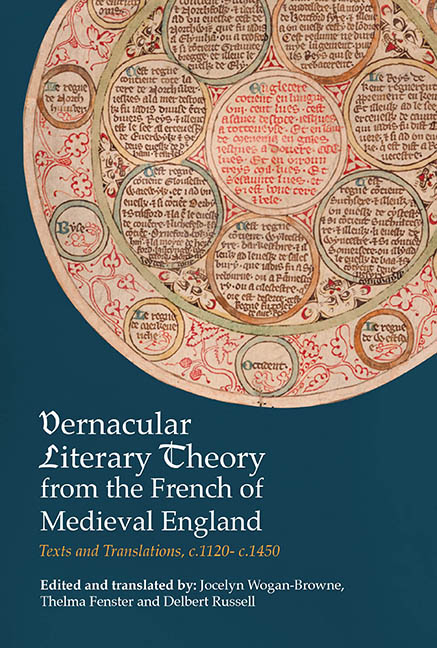 Vernacular Literary Theory from the French of Medieval England
Vernacular Literary Theory from the French of Medieval England Book contents
- Frontmatter
- Dedication
- Contents
- List of Maps and Illustrations
- Preface
- Abbreviations
- Map
- General Introduction
- Establishment of Texts and Translations and Conventions Used
- Part I Faus franceis and dreit engleis: On Language
- Part II Si sa dame ne li aidast: Authorship and the Patron
- Part III Primes dirrum la dreyte fei: The Conduct of Reading, Hearing and Seeing
- Part IV Ki veult oïr: Forming Audiences and Creating Textual Communities
- Part V Si come en latyn trovay escrit: The Lineage of the Text
- Postlude. Honneurs publiées … en divers royaumes
- Part VI Essays and Resources
- Timeline
- Glossary
- Bibliography
- General Index
- Index of Manuscripts
Part II - Si sa dame ne li aidast: Authorship and the Patron
Published online by Cambridge University Press: 25 October 2017
- Frontmatter
- Dedication
- Contents
- List of Maps and Illustrations
- Preface
- Abbreviations
- Map
- General Introduction
- Establishment of Texts and Translations and Conventions Used
- Part I Faus franceis and dreit engleis: On Language
- Part II Si sa dame ne li aidast: Authorship and the Patron
- Part III Primes dirrum la dreyte fei: The Conduct of Reading, Hearing and Seeing
- Part IV Ki veult oïr: Forming Audiences and Creating Textual Communities
- Part V Si come en latyn trovay escrit: The Lineage of the Text
- Postlude. Honneurs publiées … en divers royaumes
- Part VI Essays and Resources
- Timeline
- Glossary
- Bibliography
- General Index
- Index of Manuscripts
Summary
Introduction
For many works in the French of England, as in other medieval literatures, textual identity comes as much or more from patron and occasion as from what is now recognised as authorship. As A. C. Spearing has argued, it is a modern paradigm to assume an individual mind as the precondition of a text, rather than to think of stories as being always already present, and individual agency in their reshaping as an incidental rather than indispensable aspect of their existence. Translatio fabulae, Christopher Baswell has pointed out, is important alongside translatio studii et imperii. The Brut, a great, multilingual congeries of material from the twelfth to the fifteenth centuries influential for many of the texts here, is an obvious instance of a literature with and without authors, not simply in terms of whether its writers are known or anonymous but whether its various texts are produced with a model of authorship as part of their identity.
Most writers in this volume are professional writers of one or another kind, necessarily so in a culture where literacy is occupationally specific rather than, as now, a defining universal stage of socialised development through compulsory school attendance. Some of them may have produced only one or two works that might be classified as literary as part of, or as an adjunct to, their career of literate work, as monastic officers, chaplains to elite households, clerks in offices of state, etc. ‘Authors’ in the texts here are biblical and patristic figures such as Solomon, Jerome, Gregory, and often, ultimately God (see Glossary auctor, auctorité, auctorizer), figures who guarantee the work as ethical and useful, to be counterposed to the pleasures of hearing about Roland and Oliver, as in (24a, 171). Writers present themselves primarily as translators, and sometimes as compilers, or copyists. Manuscript collections of a single author's vernacular works are a rare phenomenon and almost entirely a late-medieval one. As is now well recognised, none of this inhibits creativity and innovation in vernacular texts. However modestly presented their role, and however prolifically justified their work, writers of French confidently experiment in varied and changing ways from the early twelfth century onwards in England.
- Type
- Chapter
- Information
- Vernacular Literary Theory from the French of Medieval EnglandTexts and Translations, c.1120- c.1450, pp. 89 - 150Publisher: Boydell & BrewerPrint publication year: 2016


